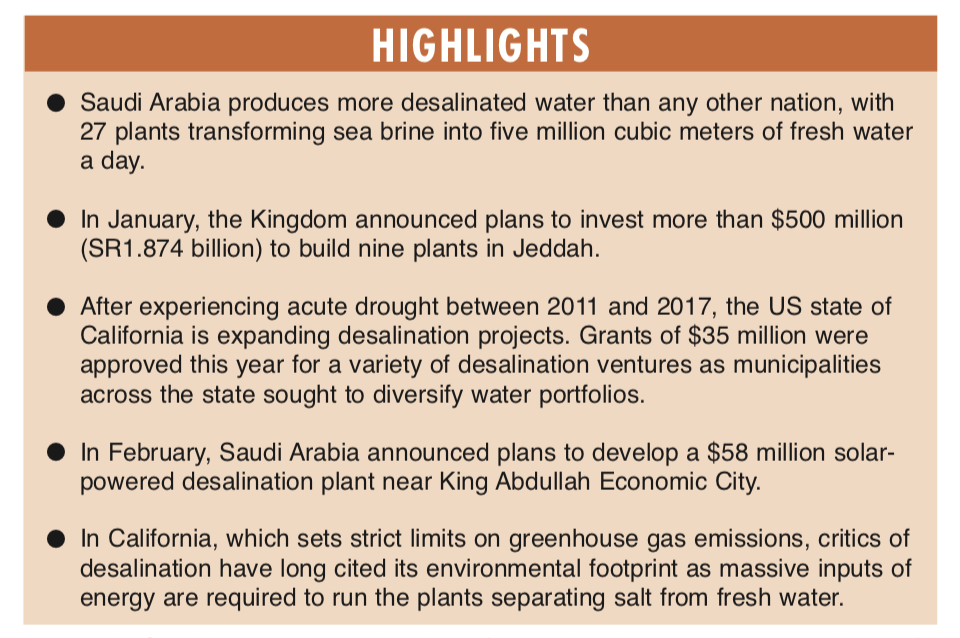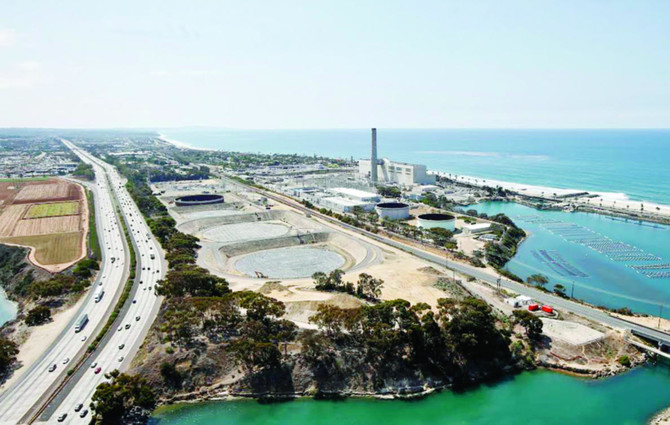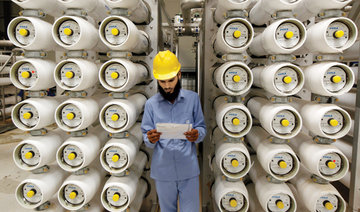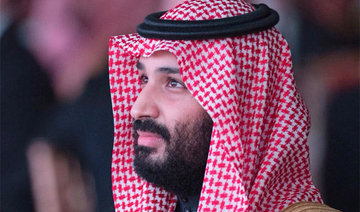SAN FRANCISCO: As water shortages become a reality across the globe, authorities in drought-prone areas are looking to Saudi Arabia’s desalination industry for inspiration.
The Kingdom produces more desalinated water than any other nation, with 27 plants transforming sea brine into five million cubic meters of fresh water a day.
The industry has grown rapidly in recent years. In January, the Kingdom announced plans to invest more than $500 million (SR1.874 billion) to build nine plants in Jeddah.
It is not the only area trying to meet the needs of a growing population demanding more fresh water. After experiencing acute drought between 2011 and 2017, the US state of California is expanding desalination projects. Grants of $35 million were approved this year for a variety of desalination ventures as municipalities across the state seek to diversify water portfolios.
Experts in California have been studying the Kingdom’s desalination projects. “The value of what is going on in Saudi Arabia and the Arab world is the recognition that water … is necessary for both long-term community and economic survival, and that good planning is key,” said Paul Kelley, the executive director of CalDesal, a not-for-profit advocacy group. He added that Saudi Arabia’s foresight in planning for a “water resilient” future was a lesson that California would do well to follow.
Increasing both the volume and efficiency of water production is among the many goals laid out in Saudi Arabia’s National Transformation Program (NTP) 2020 and Vision 2030, which seeks to wean the country from oil reliance, and build a more sustainable economy. At a conference last month, the Minister of Environment and Agriculture announced a $1.3 billion investment in water technology projects to upgrade and further develop infrastructure.
While cutting-edge desalination technology has been developed in California’s top research institutions for decades, complicated regulatory frameworks and politicians have hindered the broader application of the process, said Yoram Cohen, director of the Water Technology Research Center at the University of California, Los Angeles. “It’s one thing to develop the technology, it’s another to actually push for its deployment,” he added.
While acknowledging that the water needs of California vary greatly from those in Saudi Arabia, Cohen said the golden state could learn much from the political will shown in the Kingdom to prioritize desalination. “They’re moving forward,” he said of counterparts in Saudi Arabia.
In California, which sets strict limits on greenhouse-gas emissions, critics of desalination have long cited its environmental footprint as massive inputs of energy are required to run the plants separating salt from water.
However the industry may be moving toward a greener, future. In February, Saudi Arabia announced plans to develop a $58 million solar-powered desalination plant near King Abdullah Economic City. Construction began on the project this month, with the plant scheduled to be up and running by 2020.
It is an important step forward, Cohen said: “It illustrates that one can move toward sustainability in a dual mode — where you use renewable energy and you use renewable sea water.
“You don’t want to continue desalinating using precious energy sources, including petroleum or gas: solar energy is the way to go. That’s an investment in the future.”
Creativity and good-planning will be necessary as both Saudi Arabia and California develop resource-management plans for the future, Kelley said. While Saudi Arabia has been “pushing the innovative envelope” by investing in desalination projects and research, examples of poor governance abound.
Aside from the dramatic water shortages seen in California during the recent drought, the recent admission by municipal leaders that Cape Town would run out of potable water by this summer has renewed calls for investment in desalination. “They could well have done some desalination and followed the model of Saudi Arabia and other places around the world to make sure that at least a third of their water supply was drought-resistant,” Kelley said of Cape Town.
With global warming increasing temperatures worldwide and once-predictable weather patterns thrown into flux, the Kingdom’s commitment to reliable supplies will be “very applicable to the rest of the world,” he added.
California looks to Saudi Arabia for desalination expertise
California looks to Saudi Arabia for desalination expertise

Saudi FM meets US envoy to discuss developments in Lebanon

- Explored collaborative efforts to address challenges facing Lebanese people and in broader region
RIYADH: Saudi foreign minister Prince Faisal bin Farhan met with Amos Hochstein, the US Special Envoy to Lebanon, on Sunday at the Ministry of Foreign Affairs headquarters in Riyadh.
The meeting focused on regional issues, with particular attention given to the situation in Lebanon, the Saudi Press Agency reported.
Both sides exchanged views on recent developments and explored collaborative efforts to address the challenges facing the Lebanese people and the broader region, SPA added.
Also in attendance was Prince Yazid bin Mohammed bin Fahd Al-Farhan, advisor to the Minister of Foreign Affairs for Lebanese Affairs, who contributed to the discussions.
Saudi leadership offers condolences after death of Jordan’s Princess Majda

- Princess Majda passed away in Amman on Jan. 3, the Royal Hashemite Court said
- Swedish-born princess was born Margaretha Inga Elisabeth Lind and became known as Princess Majda after her marriage.
RIYADH: Saudi Arabia’s King Salman and Crown Prince Mohammed bin Salman sent cables of condolences to the king of Jordan after the passing of Princess Majda Raad, Saudi Press Agency reported on Sunday.
Jordan’s King Abdullah attended the funeral of Princess Majda, the wife of Prince Raad bin Zeid, at the Royal Cemetery on Friday, The Jordan Times reported.
Princess Majda passed away in Amman on Jan. 3, the Royal Hashemite Court said. The Swedish-born princess was born Margaretha Inga Elisabeth Lind and became known as Princess Majda after her marriage.
New community initiative brings Saudi artisans together for ‘Year of Handicrafts’

- Workshops held for aspiring artisans and crafters
- Events will be held throughout the year
RIYADH: The Royal Institute for Traditional Arts launched a new community initiative on Saturday with a packed day of workshops and discussions with inspiring figures in the handicrafts field.
As 2025 kicks off with the Ministry of Culture labeling it the “Year of Handicrafts,” TRITA aims to bring a sense of camaraderie to artisans and aspiring crafters with its “Wrth Community,” which will host several events through the year.

Nermeen Al-Naimi, an artisan at TRITA, told Arab News: “Today, the community of Wrth started, so that’s very good for artisans because we are looking for somewhere we can belong.
“Wrth is the place we belong now with this community, it’s more like a second house for us because we exchange experiences, we exchange techniques and tools and stuff like that. It’s a growing kind of family, so we’re happy that they made this step today, and we’re grateful.”

(AN photos by Abdulrhman Bin Shalhoub)
The six-hour event brought artisans at various levels and from various crafts together for a day of engagement through workshops on traditional crafting with wood, metals, clay, and stones.
Silversmiths Ayat Dhahi and Revan Abdulsabour shared their expertise on sculpting and formation, from design to implementation, while others, such as sculptor Helwa Al-Atawi, shared success stories of turning a passion into a career.

Jewelry designer Rughad Al-Hogail weighed in with her entrepreneurial experience of taking local crafts to international markets.
Al-Naimi is an instructor for jewelry manufacture and design, but came to the inaugural Wrth event as a student, signing up for a wood-carving workshop that allows participants to identify the types of traditional engravings in the Najd region, and producing a wooden coaster using the technique with a copper inlay.

“I decided to go back to wood because I did clay before, and I did metals before, so I wanted to incorporate wood in my designs …
“It has metal in it, so, the experience was amazing because I use metal combined with wood, combined with a little bit of this technique.”

Other workshops explored traditional engraving methods, their use in the manufacture of innovative products, and employing traditional engravings in contemporary art.
Al-Naimi works as a personal branding consultant, and part of her job is to help individuals realize their hopes and connect with ways to energize themselves.

“One of the things that makes me happy is working with my hands. So working with metal, with wood, it’s all a stress relief. Plus you make something beautiful.”
Al-Naimi joined TRITA about two years ago, working with metals, but quickly found that it was more than just a space to create.
“Here at the Royal Institute, it’s support all the way — for the trainers, for the products; they have an online store now,” she said. Here students’ creations are up for sale at the physical location and online, creating profitable opportunities for aspiring and established artisans.
Wrth Community aims to lead the revival and development handicrafts, linking them to modern design and technology, enhancing the participation of institutions and the local community to highlight the importance of traditional arts in defining cultural identity, while also equipping people with ways to create traditional arts in today’s market.
Wrth Community provides opportunities for artisans to meet, exchange knowledge and enhance personal and professional skills with a focus on education, crafts, entrepreneurship, and dialogue sessions. By creating a supportive environment, TRITA hopes to stimulate talent and creative individuals to learn and practice traditional arts and crafts.
TRITA is a pioneering organization that highlights the national identity and enriches Saudi traditional arts locally and globally, promoting them and recognizing pioneers in the fields of traditional arts. This contributes to the preservation of traditional arts by supporting national capabilities and talents while encouraging those interested in learning, mastering and developing them.
KSrelief and UNHCR officials discuss enhanced humanitarian support in Syria

- An estimated 6.8 million Syrians remain displaced within the country, while more than 5.5 million have sought refuge in neighboring countries
DAMASCUS: Officials from the King Salman Humanitarian Aid and Relief Center and the UN High Commissioner for Refugees met in Damascus on Sunday to discuss coordinated efforts to assist the Syrian people, the Saudi Press Agency reported.
The meeting, focused on bolstering humanitarian and relief operations in the region, was attended by Abdullah bin Saleh Al-Harees, charge d’affaires of the Saudi Embassy in Syria.
During the discussions, UNHCR officials praised their strategic partnership with KSrelief, highlighting the importance of their joint initiatives to support refugees and displaced persons in Syria.
Both parties also reiterated their commitment to ensuring that vulnerable populations have access to essential resources and services to live with dignity.
The humanitarian crisis in Syria remains one of the most pressing in the world, especially after the fall of Bashar Assad’s regime in December of last year, following over a decade of civil war.
Assad’s ouster came after years of intensified international sanctions and a lightning offensive across key cities by opposition militias, culminating in his government’s collapse.
An estimated 6.8 million Syrians remain displaced within the country, while more than 5.5 million have sought refuge in neighboring countries such as Turkiye, Lebanon, and Jordan.
Humanitarian organizations like KSrelief and UNHCR play a crucial role in addressing these challenges, providing essential aid such as food, shelter, and medical care.
In Syria, UNHCR has been a critical player in responding to the humanitarian crisis, assisting the millions of displaced Syrians and advocating for sustainable solutions to their plight. Its collaboration with partners such as KSrelief has been key to addressing the evolving needs of those affected by the conflict.
On Sunday, Fadi Al-Qasim, the Syrian Minister of Administrative Development in the transitional government, met with the KSrelief team in Damascus in the presence of Al-Harees.
During the meeting, they discussed strategies for delivering relief aid to support the Syrian people and civil society.
Al-Qasim expressed his gratitude to the KSrelief team for their generous assistance and praised the urgent humanitarian aid provided by Saudi Arabia to Syria.
Saudi minister receives British ambassador to Riyadh

- They discussed bilateral relations and various topics of common interest
RIYADH: Saudi Arabia’s Deputy Minister for Political Affairs Saud Al-Sati received UK Ambassador to the Kingdom Neil Crompton in Riyadh on Sunday.
During the meeting, they discussed bilateral relations and various topics of common interest, the Foreign Ministry wrote on X.
Meanwhile, Pakistan’s Ambassador to the Kingdom Ahmed Farooq signed the condolence book honoring the life and legacy of former US President Jimmy Carter, the Embassy of Pakistan wrote on X on Sunday.





















